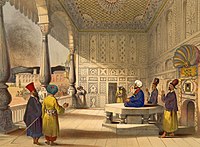| Third Anglo-Afghan War | |||||||
|---|---|---|---|---|---|---|---|
| Part of the Interwar period | |||||||
 Soldiers in action at Kohat during the Third Anglo-Afghan War | |||||||
| |||||||
| Belligerents | |||||||
| Commanders and leaders | |||||||
|
| ||||||
| Strength | |||||||
| 50,000 man standing army supported by up to 80,000 tribesmen |
8 divisions 5 independent brigades 3 cavalry brigades, plus a number of modern aircraft, armoured cars and artillery | ||||||
| Casualties and losses | |||||||
|
1,000 dead[3] Hundreds more killed from wounds[3] |
1,751 dead or wounded[3] Hundreds more killed by disease[3][4] 3 planes destroyed[5] | ||||||
| History of Afghanistan |
|---|
 |
| Timeline |
The Third Anglo-Afghan War[a] was a short war which began on 3 May and ended on 8 August 1919. The new Amir of the Emirate of Afghanistan Amanullah Khan declared a Jihad against the British in the hope to proclaim full independence, as well as to strengthen his own legitimacy. Amanullah's forces invaded British India on three fronts taking advantage of the unrest in India, in an effort to seize the old Afghan provinces west of the River Indus.
Despite some initial success, the Afghan invasion was however repelled by the British, the latter who were reinforced and responded in force. The Afghans were then driven back across the border via the Khyber Pass towards Jalalabad, with the British occupying Dacca and Spin Boldak by the end of May. Further Afghan incursions and tribal uprisings attacks were contained such as in Thal. The Royal Air Force were also used in bombing and strafing attacks on the frontier tribes as well as targets within Afghanistan, including Kabul and Jalalabad. Although small in scale, it was a contributing force for Amanullah to call for an armistice in June.
The Anglo-Afghan Treaty of 1919 was signed on 8 August which resulted in the Afghans re-gaining dejure control of foreign affairs from Britain,[b] and the Afghans recognizing the Durand Line as the border.[8]
- ^ Adamec, Ludwig; Norris, J.A (1985). "Encyclopaedia Iranica". Encyclopaedia Iranica. Archived from the original on 8 September 2024.
This was an undeclared war that lasted from 4 May to 3 June and resulted in Afghanistan's winning complete independence.
- ^ Suhrke, Astri (2011). When More is Less: The International Project in Afghanistan. Hurst. p. 150. ISBN 978-1-84904-164-5.
One of Amanullah's first actions was to launch a surprise attack on the British in what became the third Anglo-Afghan war (1919). An Afghan victory forced the British to end their formal enroachments on Afghanistan's sovereignty...
- ^ a b c d Lee 2019, p. 459.
- ^ Lansford 2017, p. 49.
- ^ Loyn 2009, p. 170
- ^ a b Muhammad & McChesney 1999, p. 50.
- ^ Lee 2019, p. 395-397.
- ^ Cite error: The named reference
Barthorp157was invoked but never defined (see the help page).
Cite error: There are <ref group=lower-alpha> tags or {{efn}} templates on this page, but the references will not show without a {{reflist|group=lower-alpha}} template or {{notelist}} template (see the help page).